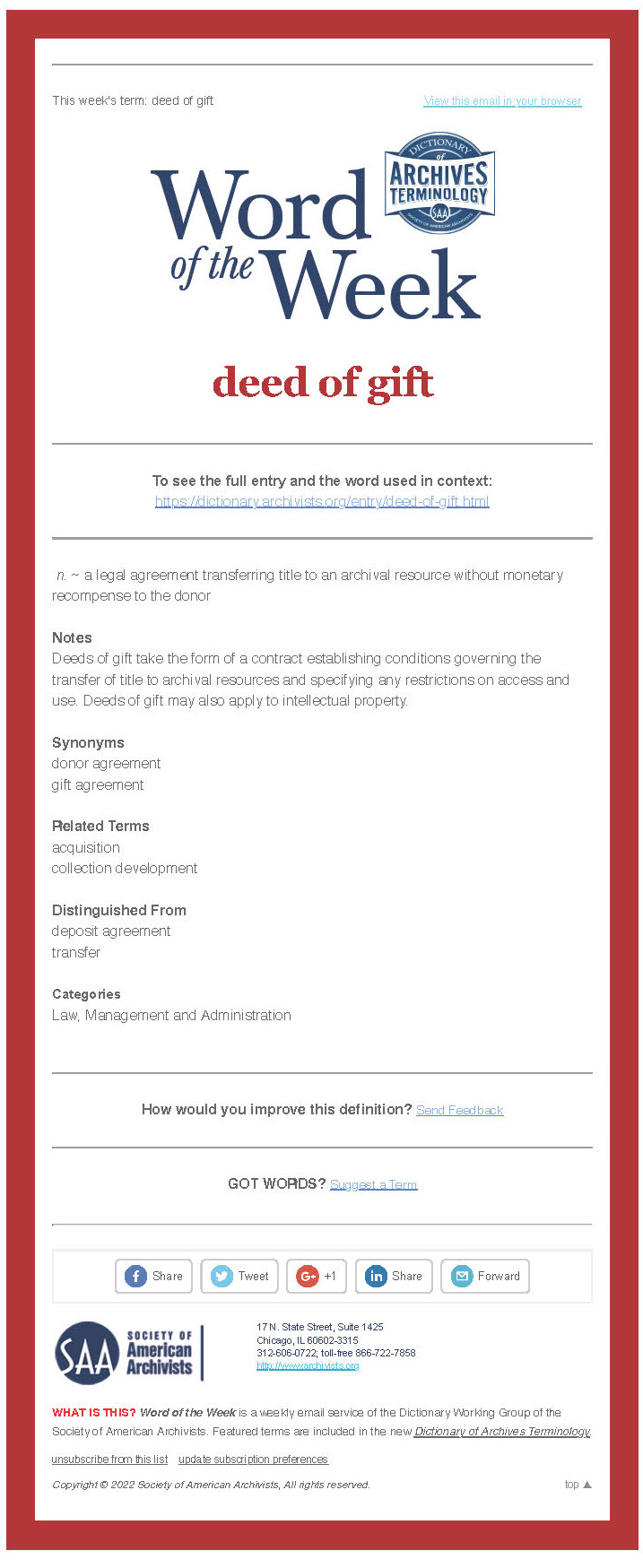The Dictionary Working Group of the Society of American Archivists keeps me abreast of archival vocabulary through their email service. The latest installment is a term–Deed of Gift— I use and define for our patrons and donors on a weekly basis. Click here for more and to subscribe.

SAA has a very nice brochure explaining Deeds of Gift. This paragraph, I think, is especially useful:
Donors of historical materials are individuals or organizations that give materials to repositories, including historical societies, archives, or special collections libraries. Donated materials often include papers, records, and digital material documenting personal lives and family history or the history of organizations such as businesses, community associations, and religious groups. Repositories are administered by professional archivists, curators, or librarians, who assemble these materials, preserve them, and make them available for research. The relationship between you—as a donor—and a repository must be based on a common understanding of your wishes and the ability of the repository to carry out its mission and responsibilities. You should review the materials being offered for donation with the archivist or curator and discuss the repository’s policies and procedures for the care and use of donated materials. Most repositories have a collecting policy that informs their decisions about what they can accept. If both parties agree that the repository is an appropriate place for preservation of the materials, then both parties sign a deed of gift.
We use deeds of gift for all incoming archival collections. Archival collections are by nature unique and unpublished. They are often wholly the product of the donor’s creative work, though sometimes they will contain items that were published or widely disseminated. But by and large they are privately created. For this reason we execute deeds of gift which govern the transfer of custody and ownership of the physical objects along with accompanying intellectual property rights. We do not use deeds of gift for donations of published materials such as books or periodicals.
Here is the sample deed of gift I give to prospective donors: Deed of Gift_SAMPLE
My basic assumption is that we will only add archival collections that directly relate to our central collecting foci. Part of building an excellent archive in a chosen area is locating and saying ‘yes’ to the right kinds of collections. The corollary is saying ‘no’ to the wrong kinds of collections. Preserving the right kinds of collections is our core mission. So if I am talking with donors about deeds of gift, I am already talking about collections of materials that are candidates for permanent preservation. So, executing a deed of gift facilitates our work in preserving them permanently. When we say ‘yes’ we are in it for the long haul: significant investment of several kinds of resources, and we will only do that for collections which we own. To do otherwise is poor stewardship of our resources. As I describe this for our donors, I like to stress that this small bit of paperwork facilitates access: it governs us as we receive collections, holds us accountable to preserve them, and enables us to make these valuable materials available for scholarly research.
